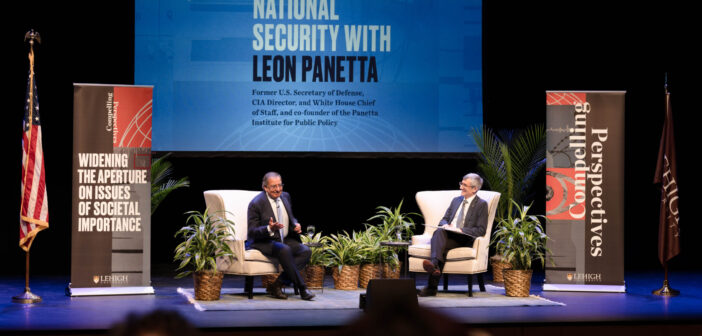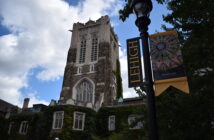Leon Panetta drove home his staunch stance on striving for better national security to a packed Baker Hall on Jan. 30 for the second installment of the Compelling Perspectives conversations.
“The biggest national security threat is having a dysfunctional Washington,” Panetta said in his remarks.
Compelling Perspectives is a speaker series introduced this year where leaders and experts in their fields are invited to take part in an open conversation with the Lehigh community. The theme of this year’s conversations is national security.
Provost Nathan Urban said in his opening remarks, the purpose of the event is to hold “constructive conversations on challenging topics” and cultivate an openness to viewpoints from which we may disagree.
The former Secretary of Defense came straight from Washington, having testified the same morning to the House Select Committee on the Strategic Competition between the United States and Chinese Communist Party alongside former Secretary of State Mike Pompeo.
Panetta has served an extensive career of public service spanning more than 50 years, as former U.S. Secretary of Defense, director of the CIA, White House Chief of Staff for the Clinton administration, director of the Office of Management and Budget and U.S. Representative from California.
He emphasized throughout the night that if the U.S. fails to govern from a place of leadership, it will inevitably govern from crisis. He stated over his decades in government that he “saw Washington work,” citing being in Congress at a time when Majority Leader “Tip” O’Neill worked with Republican leader Bob Michel.
He said there is a price to pay governing by crisis, and as exhibited in Congress’ failure to pass resolved budgets, this debt will be passed to the next generation.
“If I were in Congress now you’d probably find me in the Potomac,” Panetta said.
He stated the U.S. must govern from leadership and create alliances in a pivotal time abroad and domestically. He said this means supporting allies against autocrats and adversaries and financially backing Ukraine, Israel and Taiwan.
“The key to dealing with these issues is having the U.S. and its allies working together,” he said. “America can’t do it alone.”
Panetta said an advantage the U.S. has over these autocratic states is that they are not as good at creating these alliances.
Brennan Schaefer, a faculty member in the physics department, said he felt Panetta’s message was necessary at this moment.
“I mean the questions were kind of, he got some softballs, that’s OK,” he said. “It’s a really divided time, so I think we need unified messages more like his. I thought it was really good.”
During the Q&A section of the event, an undergraduate student asked Panetta about the loss of life in Gaza during the ongoing conflict between Israel and Hamas.
The student was concerned with balancing the U.S.’s position as an ally to Israel with the expectation that they are held to a certain moral standard.
Panetta responded by saying that we must do more to promote a Palestinian state with leadership strong enough to maintain peace in the region.
“I thought it was a decent answer about the overall importance of leadership and the U.S.’s role in sovereignty, the Middle East and various conflicts,” the student said. “Could he have been a bit more specific, maybe.”
Panetta emphasized his optimism in emboldening the next generation of leaders, exemplified in his establishment with his wife Sylvia Panetta of the Panetta Institute for Public Policy at California State University, Monterey Bay, which educates students in public policy and service.
His son, Jimmy Panetta, now represents California’s 19th district, in the same seat that he once sat. He said he is glad his son learned the most important lesson, “to bond with others.”
As the son of Italian immigrants, he emphasized the importance of giving back to a country that afforded his family the American dream. He said protecting national security keeps that dream alive.
“When I asked my immigrant parents why they chose to come to America, they said it was because they believed they would be able to build a better life for me and my family,” he said. “That’s the American dream, and it’s a dream that I have benefited from.”






Comment policy
Comments posted to The Brown and White website are reviewed by a moderator before being approved. Incendiary speech or harassing language, including comments targeted at individuals, may be deemed unacceptable and not published. Spam and other soliciting will also be declined.
The Brown and White also reserves the right to not publish entirely anonymous comments.